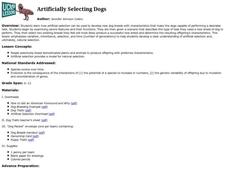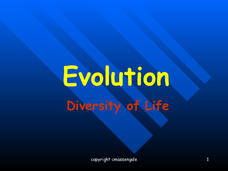Artificial Selection Teacher Resources
Find Artificial Selection lesson plans and worksheets
Showing 63 resources
Lesson Planet Curated

Crash Course: Biology
Imagine an entire biology course in one collection of 40 videos! Based on the AP Biology curriculum, viewers learn about the things that make up living things and the processes that keep organisms alive. They also learn how to identify...
University of California
Artificially Selecting Dogs
Selective breeding has resulted in some novel and beautiful or useful dogs over the years. Using the American Foxhound as an example, genetics learners find out how and why they came about. Then, in small groups, they select breeds to...
Howard Hughes Medical Institute
Natural and Artificial Selection
Many people oppose genetically modified foods yet support selective breeding in dogs. Learn about the similarities and differences through a short presentation that features many video clips. It covers natural selection, artificial...
Curated OER
Artificial Selection
The second lesson in the series begins with a starter activity discussing wild versus domesticated animals. Then, scholars play a card game, with optional variations, to emphasize artificial selection. Next, they attend a field trip to a...
Bozeman Science
Ecological Selection
Humans, through artificial selection, created a dog that is hypoallergenic, loves water, is good with kids, very smart, and comes in a variety of colors — a labradoodle. Through the analysis of dog breeds, class members explore...
Bozeman Science
Evolution Continues
Peacocks, when fanning their feathers to attract females, shake the feathers, creating an inaudible sound for humans but one that female hens can hear, even from far away. In the video, scholars explore evolution by analyzing...
Compassion in World Farming Trust
Selective Breeding of Farm Animals
Biology learners read about selective breeding in chickens and how it has produced high-yield meat specimens and rapid egg-layers. The unpleasant effects of artificial selection are explored, as well as options to supporting this...
Crash Course
Natural Selection
The peppered moth is featured in a video about natural selection. The narrator tells the story of Darwin's theory and then moves on to the principles behind natural selection and the different ways it works. Concepts covered include...
Curated OER
The Evidence for Evolution
Summarize a unit on evolutionary evidence. Learners recount information about the fossil record, molecular record, homologous structures, convergent evolution. This worksheet provides plenty of room for students to write out responses,...
Teacher's Pet
Disruption of Genetic Equilibrium
Could a population stay the exact same over time with no change in allele frequencies? The video explains the Hardy-Weinberg equilibrium theorem and the assumptions it requires. It discusses mutation, migration, gene flow, genetic drift,...
Bozeman Science
LS4B - Natural Selection
Would you survive natural selection? A video lesson prepares teachers across multiple grades to teach the concept of natural selection. The instructor explains the components of the concept and offers helpful examples.
Curated OER
Evidence for Evolution
In this evidence of evolution worksheet, students review notes given by referring to the Nelson Biology text, chapter 11/13. Students read the notes and the specified pages in the text.
Curated OER
Artificial selection
Students brainstorm a list of improvements they might make to a picture of a skinny cow to improve its milk yield. They draw ideas on the board and compare these pictures with the original and ask the students which cow they would use...
Be Smart
CRISPR and the Future of Human Evolution
Will survival of the fittest be replaced by designer babies and eugenics in the near future? The technology exists now, but scientists still debate how to best use it. The future of the human race depends on the decisions made, but no...
Curated OER
The Perfect Cow?
Students examine how cattle have evolved through natural selection and selective breeding. For this natural selection lesson students compare and contrast natural and artificial selection.
Biology Junction
Evolution – Diversity of Life
Scientists noticed animals with backbones share similar bone structure despite having different forms, such as fins, arms, and wings. Young scientists gain an appreciation for evolution by understanding the history of the theory. They...
Curated OER
Evolution worksheet
Looking at evolution in detail, this thorough learning exercise has complex questions requiring details and explanations of natural selection and diversity. Various examples of biological characteristics are available, and students...
Bozeman Science
Evidence for Evolution II
Some scientists believe humans are no longer evolving and have reached their evolutionary peak. In the video, scholars explore Darwin and his published work, The Origin of Species. The instructor discusses Darwin's ideas of biogeography,...
Curated OER
Evolution Study Guide
Thirty short-answer questions comprise this detailed review of evolution theory. Many of the questions ask scholars to define vocabulary. Because short answers are required, this worksheet will take some time to complete. You could give...
Texas State Energy Conservation Office
Global Climate Change
Here is an extensive reading resource that addresses our climate change crisis. It thoroughly explains the greenhouse effect, related Earth cycles, and the history of climate change. Use it as part of the intended unit, published by the...
Curated OER
Population Biology - Biology Teaching Thesis
High schoolers explore the effects of different density-dependent and density-independent factors on population growth. They explore how the interactions of organisms can affect population growth. Students explore the pattern of...
Curated OER
Evolution Number Two
Are you looking for evidence that your high schoolers are adapting to the concepts of natural selection and evolution? Assess their knowledge with a pretest and posttest. Naturally, you can select and adapt the worksheet to be the...
Curated OER
What Parts of a Plant Do We Eat?
Did you know that tomtoes and cucumbers are actually fruits? Biology or botany beginners read about the function of flowers and fruit and find that some food items commonly called vegetables are, by definition, also fruits! Give learners...
Curated OER
Kernels of Wisdom: Investigating Natural Variations in Corn
Here is a brain-popper! Corn, or more appropriately, maize, was intentionally domesticated by humans around 9,000 years ago and over a period of hundreds to thousands of years! Genetics and botany researchers have collaborated to find...

























